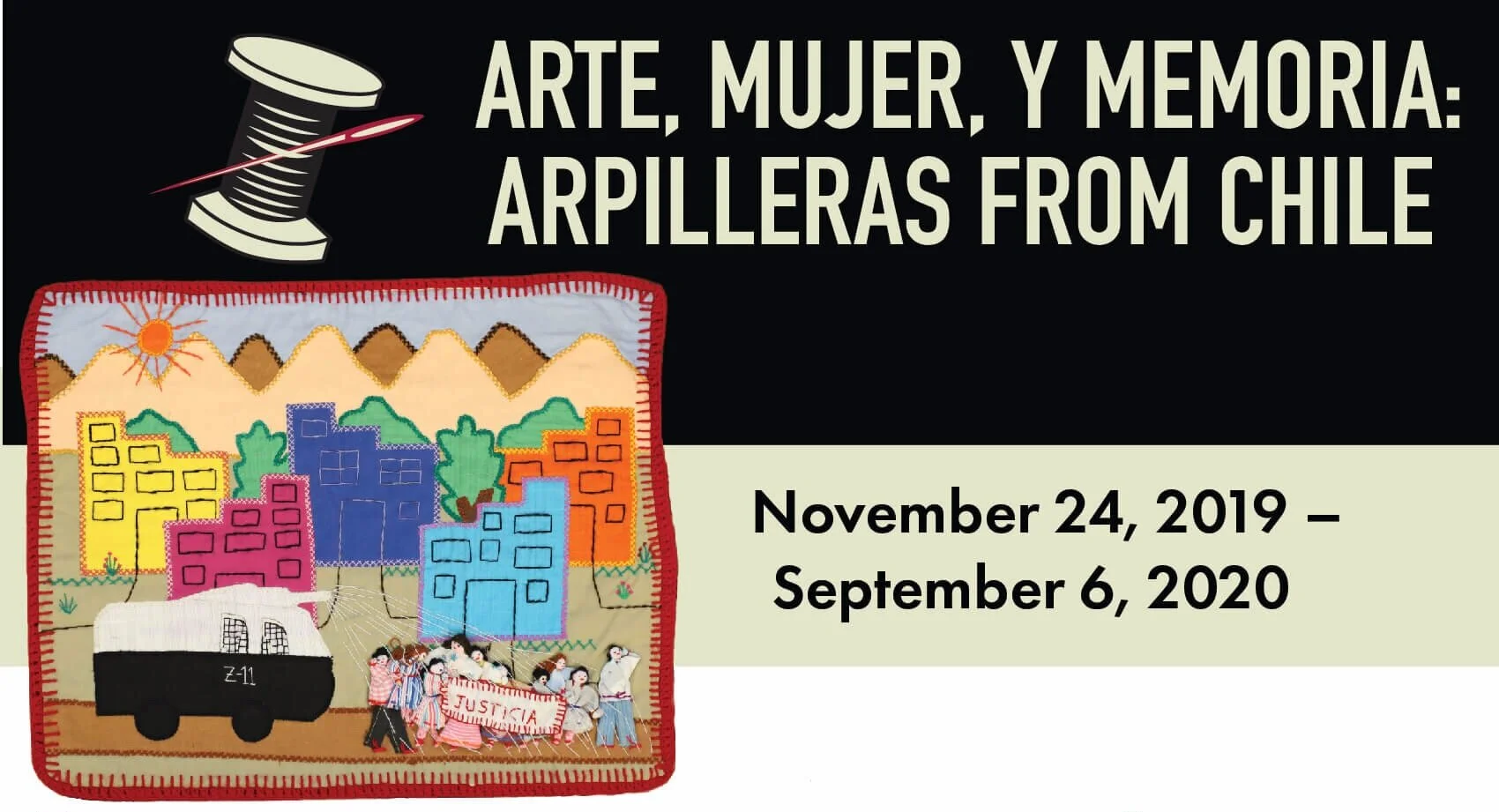“Arpilleras are like
songs that one paints”
–Violeta Parra
Arte, Mujer y Memoria:
Arpilleras from Chile
November 23, 2019 – September 6, 2020
Arpilleras are a palpable testimonies to the lived experiences of Chilean citizens throughout the brutal seventeen year Pinochet regime. Colorful textile works backed with burlap, they document the stories of women and their communities, denounce the cruelty of the government and bear witness to the human rights abuses carried out by the dictatorship.
Hundreds of thousands of people were persecuted, tortured, and imprisoned and over 3,000 were murdered under General Augusto Pinochet. Women lost breadwinners when brothers, fathers, sons, and partners disappeared. Arpillera workshops were places where they applied domestic skills to create works that expressed their frustrations and highlighted collaborative responses to their situation. Women shared their trauma, collectively looked for answers, and created textiles to sell for basic sustenance.
Many of the workshops were formed through church-based human rights organizations. Arpilleras were smuggled out of the country through international networks that connected women in Chile with their exiled sisters.
Pinochet remained in power until 1990 and continued to supervise the military until 1998. While officials tried to hide or deny the human rights abuses conducted under his administration, the tangible nature of the arpilleras and the global attention they garnered made it impossible to deny the regime’s horrors and the lives it claimed.
The arpilleras in this exhibition were gathered by MEMCH-LA (Movement for the Emancipation of the Chilean Woman-Los Angeles) a local chapter of the global feminist organization who work to amplify the voices of Chilean women.
This exhibition was curated Gabriela Martínez, Director of Education at MOLAA.
#ArteMujeryMemoria #LasArpilleras #Chile
Note: Arpilleras were branded “tapestries of defamation” by the authoritarian regime of Augusto Pinochet. Arpilleras discovered by the government were confiscated and destroyed. Arpillera makers created their textile works anonymously or signed them only with their initials to avoid harassment and potential incarceration.
Listen
Listen to this song that the curator chose to be paired with this exhibition. What does it make you think of? How does it impact your experience of the virtual exhibition?
September 11, 1973
Chile’s democratically elected left-wing president, Salvador Allende, is overthrown in a coup orchestrated by the Chilean military. The presidential palace, known as La Moneda, is bombed repeatedly. By the end of the day, Allende is dead and Augusto Pinochet appoints himself president.
Click below to explore the artworks in this part of the exhibition.
Aftermath
Pinochet governed through fear, imposing curfews and surveillance. Individuals were identified as “ideological enemies” for embracing left-wing ideology or belonging to a labor union. They were kidnapped, tortured, and sometimes executed. The relatives of these “disappeared” pled for their return but were met with silence.
Click below to explore the artworks in this part of the exhibition.
Organized Resistance
Women begin meeting at arpillera workshops where they create textiles that can be sold to ease financial hardship. Workshops become sites of grassroots organization where groups of women plan protests and find solutions to sourcing electricity, water and food.
Click below to explore the artworks in this part of the exhibition.
MEMCh
Founded in 1935, Movement for the Emancipation of the Chilean Woman (MEMCh) is a global non-partisan network that amplifies the voices of women. Throughout its history MEMCh has pushed for suffrage, equal education, and reproductive rights and has opposed fascism. MEMCh was dissolved in 1953 but reemerged thirty years later with the purpose of restoring democracy to Chile.
Click below to explore the artworks in this part of the exhibition.
Arpilleras Today
As Chileans resume dialogues regarding democracy, power, and resistance, the arpillera tradition persists as a relevant and dynamic form of cultural and political expression. The current Chilean protests were sparked by income inequality and access to basic resources and led to a temporary suspension of freedom of assembly. In response, arpilleristas today create works that engage themes originally considered subversive by Pinochet’s authoritarian state. This insurgent legacy amplifies the expressive power of arpilleras and the collective voices of women.
Click below to explore the artworks in this part of the exhibition.
At Home Resources
The exhibition doesn’t end here! Continue to explore the themes, ideas, and questions that were addressed on your own. Find links to curriculum, art making activities, recorded lectures, related news articles, and more!
Click below to further your investigations.
Credits & Sponsors
This exhibition was generously sponsored in part by Terry Hines & Associates.
Special thanks to MEMCH - Los Angeles (Movimiento Pro-Emancipación de las Mujeres de Chile) and their lenders without whose generosity this exhibition would not be possible: Mario Avendaño, Margaret Beemer, Rosalind Bresnahan, Francisco Letelier, Isabel Morel Letelier, Elsa Vásquez Martin, Bestabe Mazzolotti, Marisol Quintana, and Dr. Atilio Quintana
MOLAA is generously supported, in part, by the Robert Gumbiner Foundation and by a grant from the Arts Council for Long Beach and the City of Long Beach.








